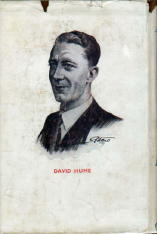Tue 6 Mar 2007
More on J. V. TURNER a/k/a DAVID HUME
Posted by Steve under Authors , Characters , Crime Fiction IV , Reference works / BiographiesNo Comments
Following my review of Requiem for Rogues and my overview of author David Hume’s career, I received enough follow-up comments to warrant making an entire blog entry out of them. First from the Yahoo Golden Age of Detection group, here’s a reply from Curt Evans:
My survey of Turner did not indicate to me that he was a lost great. The Hume books seemed beat ’em up thrillers. The Turner and Brady books are more detection, with amateurs Amos Petrie and Ebenezer Buckle. It looks like Turner had his feet planted firmly in both schools of mystery fiction. I’ve read a couple of the Petries and Buckles, but the only one that stood out in any way for me was The Fair Murder, which had some quite exceptionally grotesque elements – it certainly is not cosy!

In my review and other commentary, I wondered about Turner’s death at the young age of 45. Victor Berch discovered his obituary in the NY Times [dated 02-06-45], but nothing in it referred to the cause of his passing. He had died the day earlier. I’ll quote briefly from the obituary anyway:
“Frequently he spent weeks at a time living in London’s underworld to mix with criminals.
“A reviewer of [They Called Him Death, 1934/35] in The New York Times commented, ‘Swift action and plenty of it make this story a good example of the mystery-adventure type of thriller. If you prefer subtle deduction, you must look elsewhere.'”
I also wondered about Mick Cardby and whether his father should be also included as a series character in Allen J. Hubin’s Crime Fiction IV. Al replied:
As for the Cardbys, Bill Lofts has this to say:
“The business of Cardby & Son, private detectives of Henrietta Street, Covent Garden, had been built up with the trust of both police and crooks. Whilst Mick Cardby was the younger and more prominent, Cardby senior had spent twenty years of distinguished service at Scotland Yard, reaching the rank of Chief Inspector.”
I owned 33 David Hume titles once upon a time, and I rather think I chose Cardby the younger because that’s the way the books were promoted … as Mick Cardby tales.
Altogether you’ve certainly convinced me that Mick Cardby, the son, is the principal player, with the father taking the lesser role. Mick Cardby books, they are!
Many thanks to Curt, Victor and Al for filling in some of the details on J. V. Turner, a/k/a David Hume. As usual, gents, it’s been a pleasure.
And by the not-so-insignificant way, I missed the quote from the Bill Lofts website the other day, and I shouldn’t have. And neither should you, if you are interested in mysteries published during the Golden Age of Detection and certainly no later than 1960.
Entitled The Crime Fighters, by W. O. G. Lofts and Derek Adley, it’s yet another project that Al Hubin is working on, putting online an alphabetical listing of many of the fictional characters found in all of those books, beginning with Pat & Jean Abbott (Frances Crane) and ending with Inspector Furneaux (Louis Tracy).
Um, yes. Unfortunately, only letters A through F are online and accounted for so far. It’s still worth your time visiting, and if you’re like me, you may stay a while.
From the Introduction:
* the private detective
* the private eye
* the official police investigator
* the amateur sleuth
* the adventurer type of detective, such as Bulldog Drummond and Norman Conquest, who were always on the side of law and order, as well as Robin Hood types like the Saint who were active on both sides
* the secret service agent of the Tiger Standish type, who nearly always worked with the Special Branch at Scotland Yard (but not those of the James Bond type, who were purely engaged in spying and espionage and rarely worked in collaboration with the police).
Thus, in general, we cover the fighters of evil-doers, but of course not including the American super-hero of the Superman type. The closest we come to this type is The Shadow and Doc Savage, who, while having certain mystic powers, are nonetheless ordinary men.
We have endeavoured in the main to include detectives and the like who have appeared in British publications, although we have found that most of those of any repute appearing in book form in this country have likewise appeared in the U.S., and of course the reverse is true.